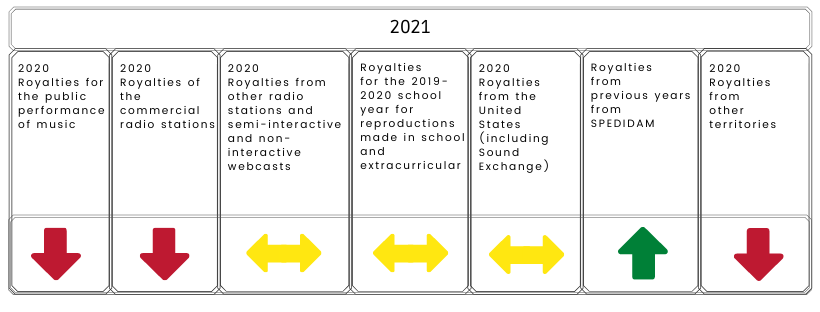COVID-19: repercussions in 2021
Royalties in 2020
Many of you have suffered from the pandemic in countless ways, including the cancellation of many shows and festivals planned during the spring and summer.
Fortunately, the royalties distributed by Artisti during 2020 did not suffer the impact and you had essentially access to the same royalties as those you received in the past for the use of your recordings on the radio and in public places.
The reason for this continuity despite the crisis is that the royalties distributed to you by Artisti during a given year are generally those generated during the previous year. There are exceptions to this rule (especially for the SoundExchange royalties which can sometimes reach us more quickly) but in general, your neighboring rights work that way. In 2020, Artisti’s royalties have therefore not decreased because these are the royalties from 2019 or retroactive years, at which time COVID-19 and a global pandemic were a threat only seen in science fiction.
What to expect in 2021
Well, in 2021, it is mainly the 2020 royalties that will be distributed and you may therefore see the amount of some royalties decrease.
What royalties?
We expect the most significant drop in equitable remuneration royalties will be related to royalties for public performance of music. Indeed, as restaurants, bars, hair salons, gyms and other public places were closed as of early March 2020, they did not have to pay royalties during this period.
Although many businesses and other public places have been able to gradually resume their activities, we know with certainty that for a few months (March to July), there had been a dramatic drop in income and that a return to normal could not be expected for the moment, as public places are operating at reduced capacity and a number of businesses had to definitively shut down.
A small consolation
In Canada, unlike in many territories in Europe, royalties for the public performance of music (in public places) are not the main source of royalties and the impact of their decline will be felt less severely.
However, for those of you who broadcast a lot in European public places, you may see the royalties from these countries decrease significantly.
Otherwise, a decrease in royalties for commercial radio broadcasts is also expected. As the revenues of commercial radio stations are mainly paid by advertisers, and several of them have been forced to close or have seen a significant decrease in their activities, they have stopped advertising on the radio. The resulting loss of income translates to a drop in the royalties paid to the artists broadcasted on the radio. The impact of this drop in royalties will be greater because the royalties paid by commercial radio stations represent a significant portion of the Canadian royalties paid to you.
A light on the horizon
The other royalties for public broadcasting of your music should remain stable. Thus, the royalties for the broadcasting on the CBC radio will not decrease and the royalties from the United States (including the royalties from SoundExchange) should not fluctuate either (we remind you that to our neighbors to the South, there is no equitable remuneration paid to performers for the broadcast of their music in public places or commercial radio, which are the two equitable remuneration streams most affected by the health crisis).
It will be the same for the royalties related to the reproduction of your performance made for schools educational programs or extracurricular. Indeed, these royalties paid by the Ministry of Education will remain stable.
Finally, we recently received a large retroactive payment of royalties from the French society SPEDIDAM which should be subject of a distribution in 2021 and compensate, for some of you, the losses arising from the drop of other sources of royalties that will occur that same year.

